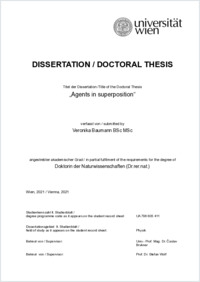Agents in superposition
- Baumann, Veronika
- Brukner, Caslav (Degree supervisor)
- Wolf, Stefan (Degree committee member)
-
15.09.2021
116 p
Thèse de doctorat: Università della Svizzera italiana, 2021
English
The idea of agents in superposition is central to both encapsulated observers, i.e. Wigner’s-friend-type experiments, and correlations without definite causal order. An agent might be regarded as a thinking or computing entity that is able to perform operations on (other) quantum systems. In case of Wigner’s-friend setups, an agent’s ability to make predictions about other agents potentially leads to testable contradictions, if said agent is in superposition. Indefinite (quantum) causal order can be understood as superposition of the order of operations different agents perform. In this case, agents with access to non-casual processes can outperform agents with only causal processes as a resource in certain computational tasks. We started working on the topic of indefinite causal order contributing to the notion of effectively definite causal order in the bipartite case. The main part of the work presented in this thesis was done on scenarios containing observations of observers, i.e. encapsulated observers or Wigner’s-friend-type experiments. We made a clear distinction between the formalism and the interpretations of quantum theory and showed that there are actually two inequivalent quantum formalisms. If different agents in a Wigner’s-friend setup use different formal descriptions for a quantum measurement, they arrive at contradicting statements. This, however, becomes manifest only if there are classical records of these statements that can be compared at some point. In order to arrive at consistent probability assignments for setups comprising encapsulated observers, we analyzed such a setup within the Page-Wootters formalism, arriving at three possible probability rules, all of which exclude any observable contradictions for Wigner’s-friend experiments. Finally, we adapted the Page- Wootters formalism to enable it to capture certain, well understood, processes with indefinite causal order: Those where the order of event is coherently controlled by a quantum system.
- Language
-
- English
- Classification
- Computer science and technology
- License
-
License undefined
- Identifiers
-
- RERO DOC 333503
- URN urn:nbn:ch:rero-006-119534
- ARK ark:/12658/srd1319344
- Persistent URL
- https://n2t.net/ark:/12658/srd1319344
Statistics
Document views: 1764
File downloads:
- Texte intégral: 680
